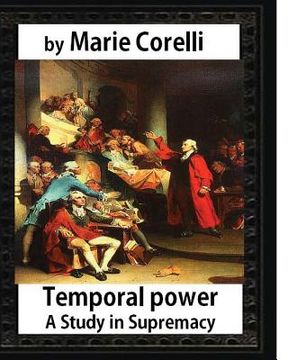Synopsis "Temporal Power: a Study in Supremacy (1902), by Marie Corelli (novel)"
Marie Corelli was a British writer during the Victorian era. Corelli was the most popular writer of fiction during her time. This edition of Temporal Power: A Study in Supremacy (original text) Marie Corelli ( 1 May 1855 - 21 April 1924) was a British novelist. She enjoyed a period of great literary success from the publication of her first novel in 1886 until World War I. Corelli's novels sold more copies than the combined sales of popular contemporaries, including Arthur Conan Doyle, H. G. Wells, and Rudyard Kipling, although critics often derided her work as "the favourite of the common multitude."Mary Mackay was born in London to Elizabeth Mills, a servant of the Scottish poet and songwriter Dr. Charles Mackay, her biological father.[3] In 1866, eleven-year-old Mary was sent to a Parisian convent to further her education. She returned to Britain four years later in 1870. Mackay began her career as a musician, adopting the name Marie Corelli for her billing. Eventually she turned to writing and published her first novel, A Romance of Two Worlds, in 1886. In her time, she was the most widely read author of fiction. Her works were collected by Winston Churchill, Randolph Churchill, and members of the British Royal Family, among others. Mackay faced criticism from the literary elite for her overly melodramatic writing. In The Spectator, Grant Allen called her "a woman of deplorable talent who imagined that she was a genius, and was accepted as a genius by a public to whose commonplace sentimentalities and prejudices she gave a glamorous setting." James Agate represented her as combining "the imagination of a Poe with the style of an Ouida and the mentality of a nursemaid." A recurring theme in Corelli's books is her attempt to reconcile Christianity with reincarnation, astral projection, and other mystical ideas. Her books were a part of the foundation of today's New Age religion. Her portrait was painted by Helen Donald-Smith. Corelli famously had little time for the press. In 1902 she wrote to the editor of The Gentlewoman to complain that her name had been left out of a list of the guests in the Royal Enclosure at the Braemar Highland Gathering, saying she suspected this had been done intentionally. The editor replied that her name had indeed been left out intentionally, because of her own stated contempt for the press and for the snobbery of those wishing to appear in "news puffs" of society events. Both letters were published in full in the next issue. Corelli spent her final years in Stratford-upon-Avon. There, she fought hard for the preservation of Stratford's 17th-century buildings, and donated money to help their owners remove the plaster or brickwork that often covered their original timber framed facades. Novelist Barbara Comyns Carr mentions Corelli's guest appearance at an exhibition of Anglo-Saxon items found at Bidford-on-Avon in 1923. Corelli's eccentricity became well-known. She would boat on the Avon in a gondola, complete with a gondolier that she had brought over from Venice. In his autobiography, Mark Twain, who had a deep dislike of Corelli, describes visiting her in Stratford and how the meeting changed his perception. She died in Stratford and is buried there in the Evesham Road cemetery. Her house, Mason Croft, still stands on Church Street and is now the home of the Shakespeare Institute. For over forty years, Corelli lived with her companion, Bertha Vyver; when she died she left everything to her friend. Although she didn't self-identify as a lesbian, biographers and critics have noted the erotic descriptions of female beauty that appear regularly in Corelli's novels, while admitting they are expressed by men. Descriptions of the deep love between the two women by their contemporaries have added to the speculation that their relationship may have been romantic. Following Corelli's death, Sidney Walton reminisced in the Yorkshire Evening News:

